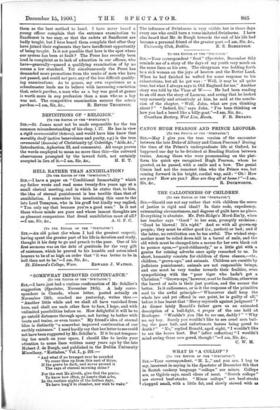" SOMEWHAT IMPROVED CONTINUANCE. " [TO THE EDITOR OF THE "SPECTATOR. "]
Szn,—I have just had a curious confirmation of Mr. Schiller's suggestion (Spectator, November 24th). A lady corre- spondent in Canada, whose letter, posted actually on November 24th, reached me yesterday, writes thus :— " Another little while and we shall all have vanished from here, and shall see each other face to face, I hope, and with unlimited possibilities before us. How delightful it will be to go untold distances through space, not having to bother with boats and trains, or even trams." My friend's idea of eternal bliss is distinctly "a somewhat improved continuation of our earthly existence." I need hardly say that her letter tome could not have been suggested by Mr. Schiller's. If it be not trespass- ing too much on your space, I should like to invite your attention to some lines written many years ago by the late Hubert J. de Burgh, and published in the Dublin University Miscellany, "Kottabos," Vol. I., p, 201 And what if no trumpet ever be sounded
To rouse thee up from this rest of thine, If the grave be dark, and never around it The rays of eternal morning shine ?
For the rest He giveth, give God the praise.
Ye know how often, ye hearts that ache,
In the restless nights of the listless days, Ye have long'd to slumber, nor wish to wake."
The influence of Swinburne is very visible, but in those days every one who could turn a verse imitated Swinburne. I have also heard that Mr. de Burgh towards the end of his life had become a personal friend of the greater poet.—I am, Sir, &c.,














































 Previous page
Previous page